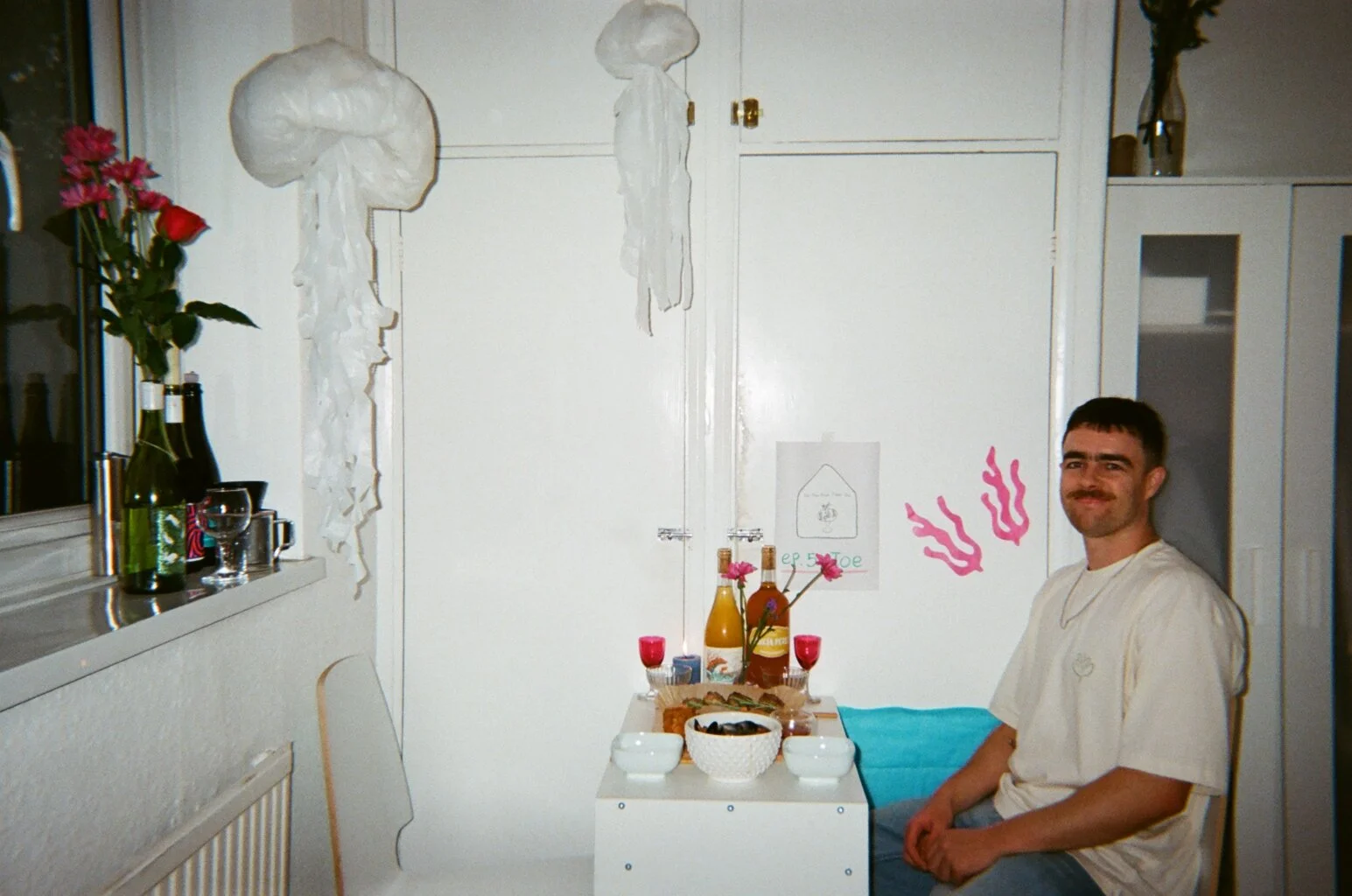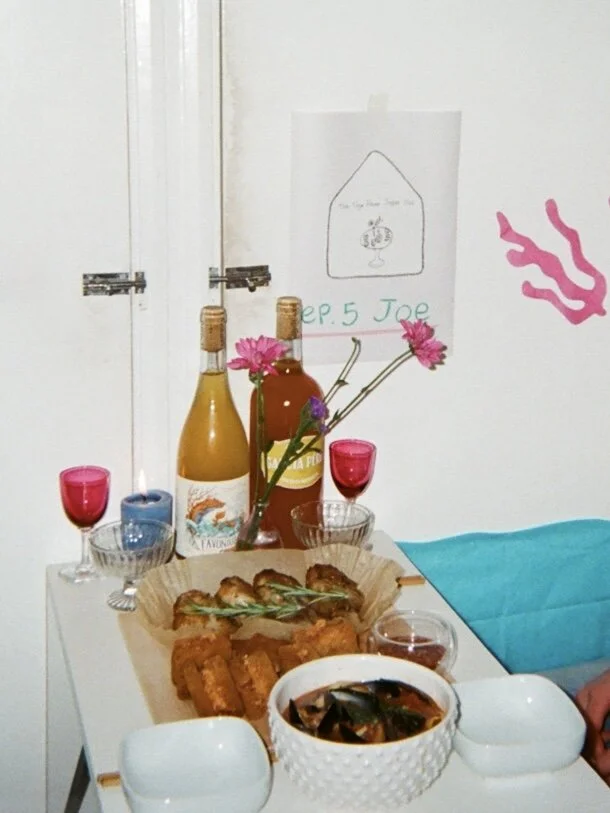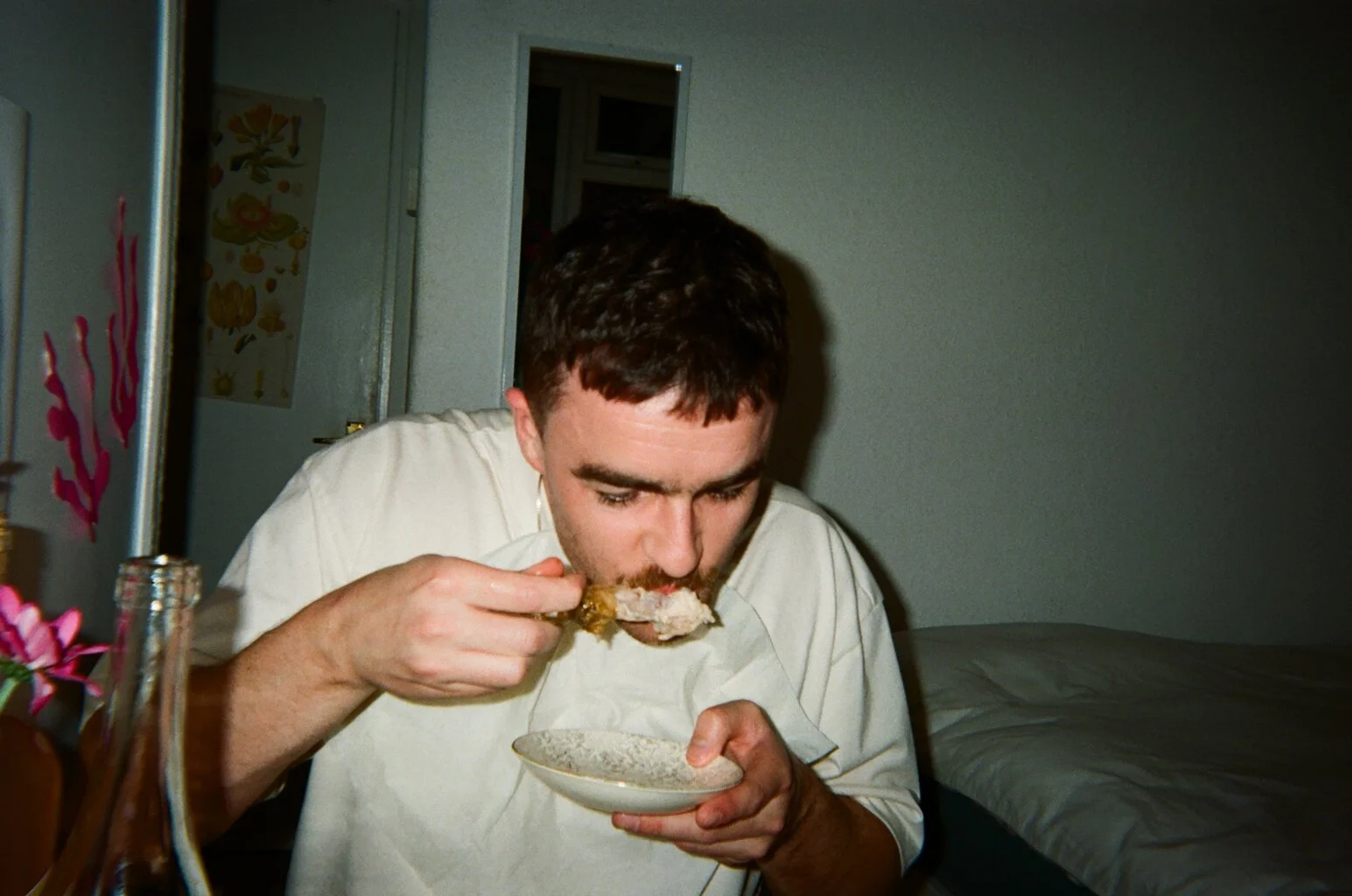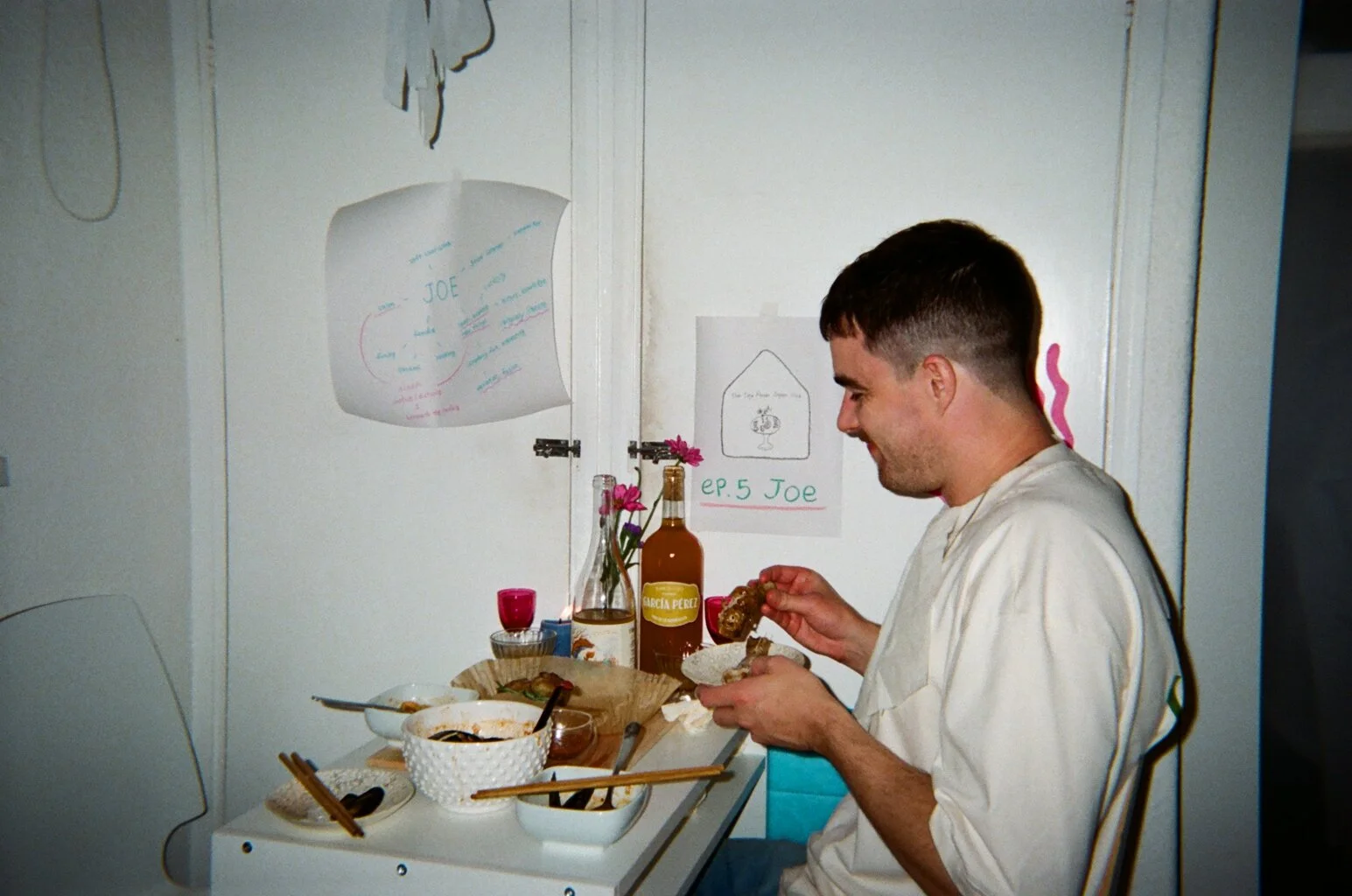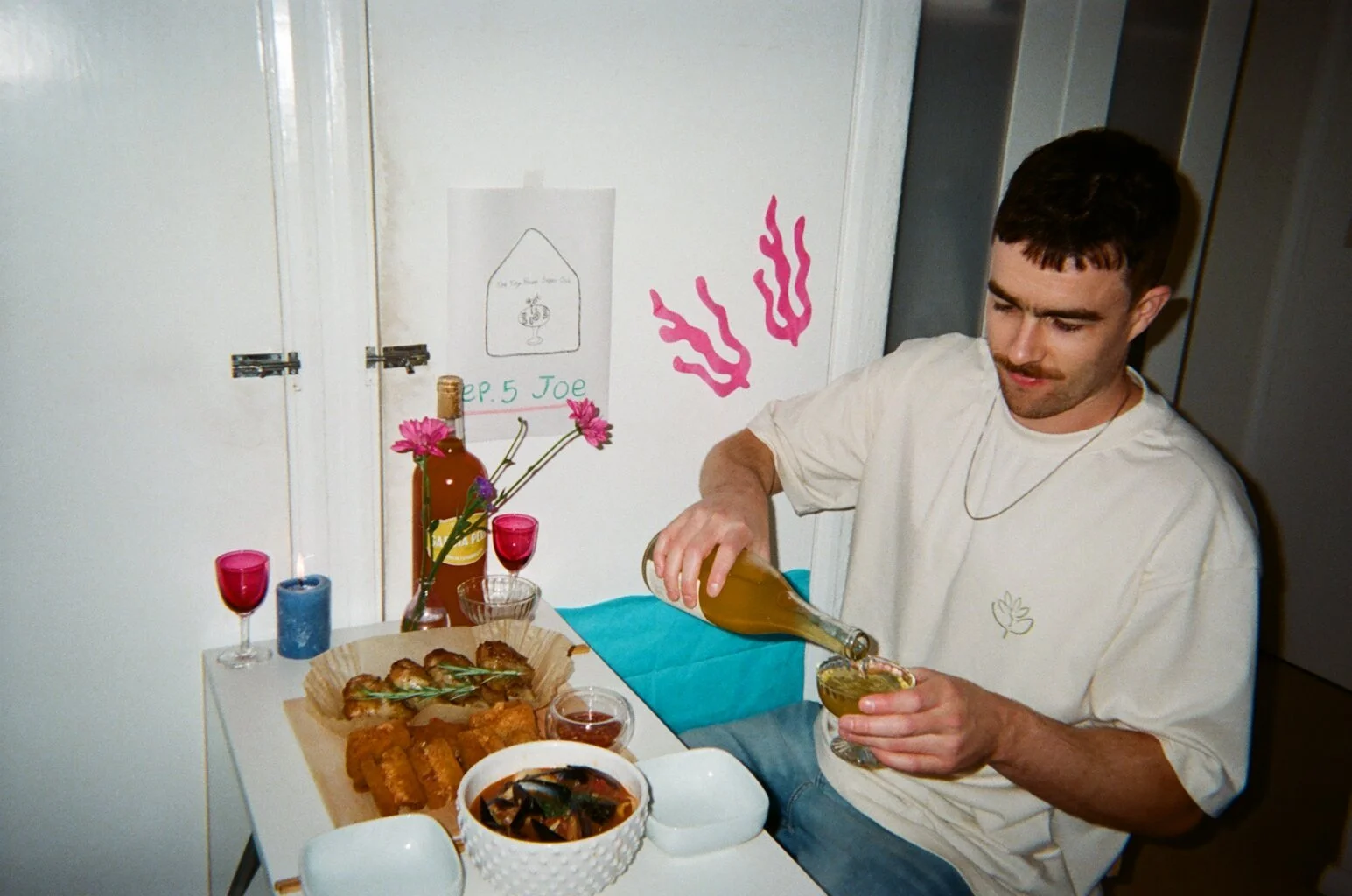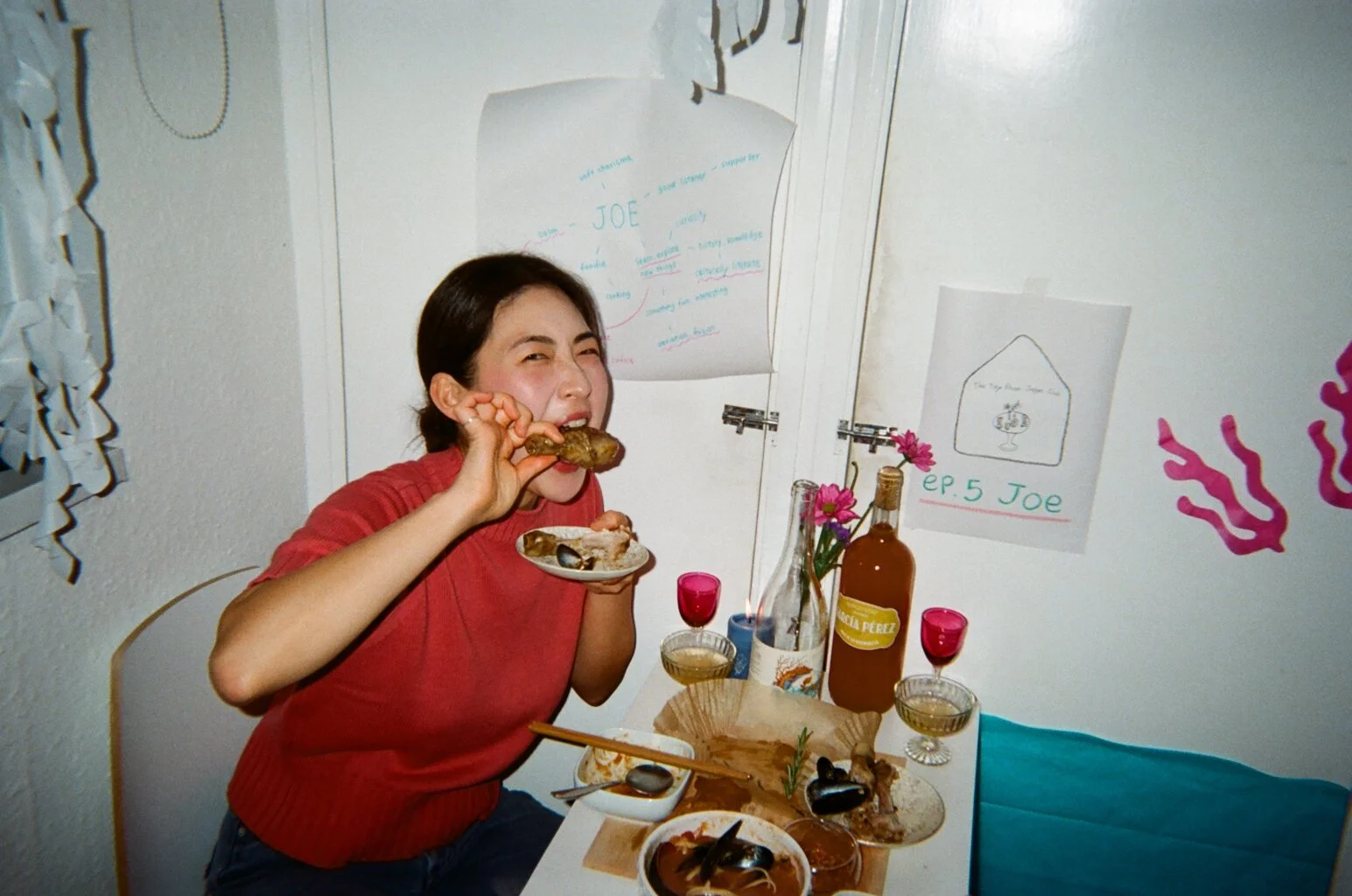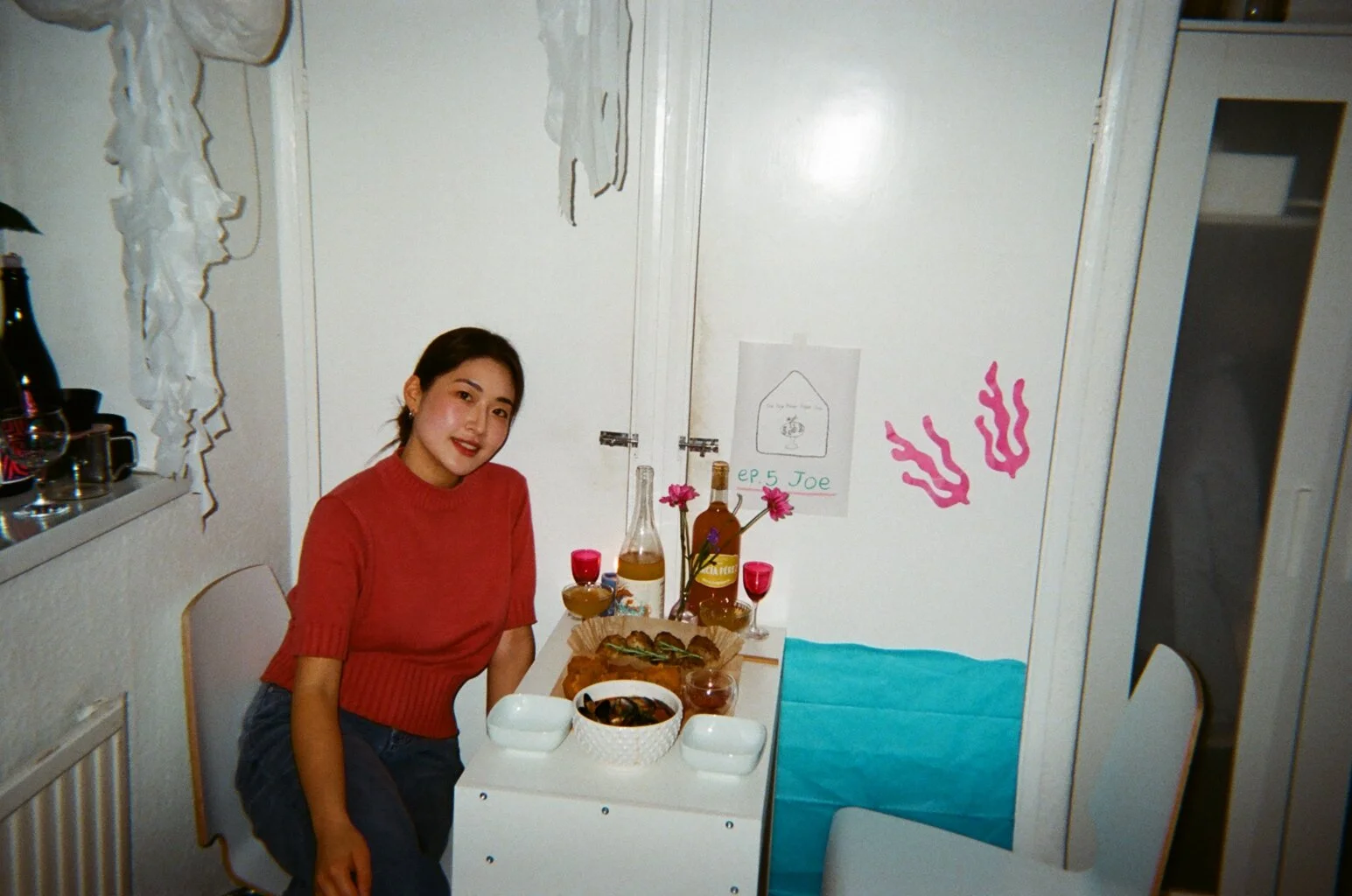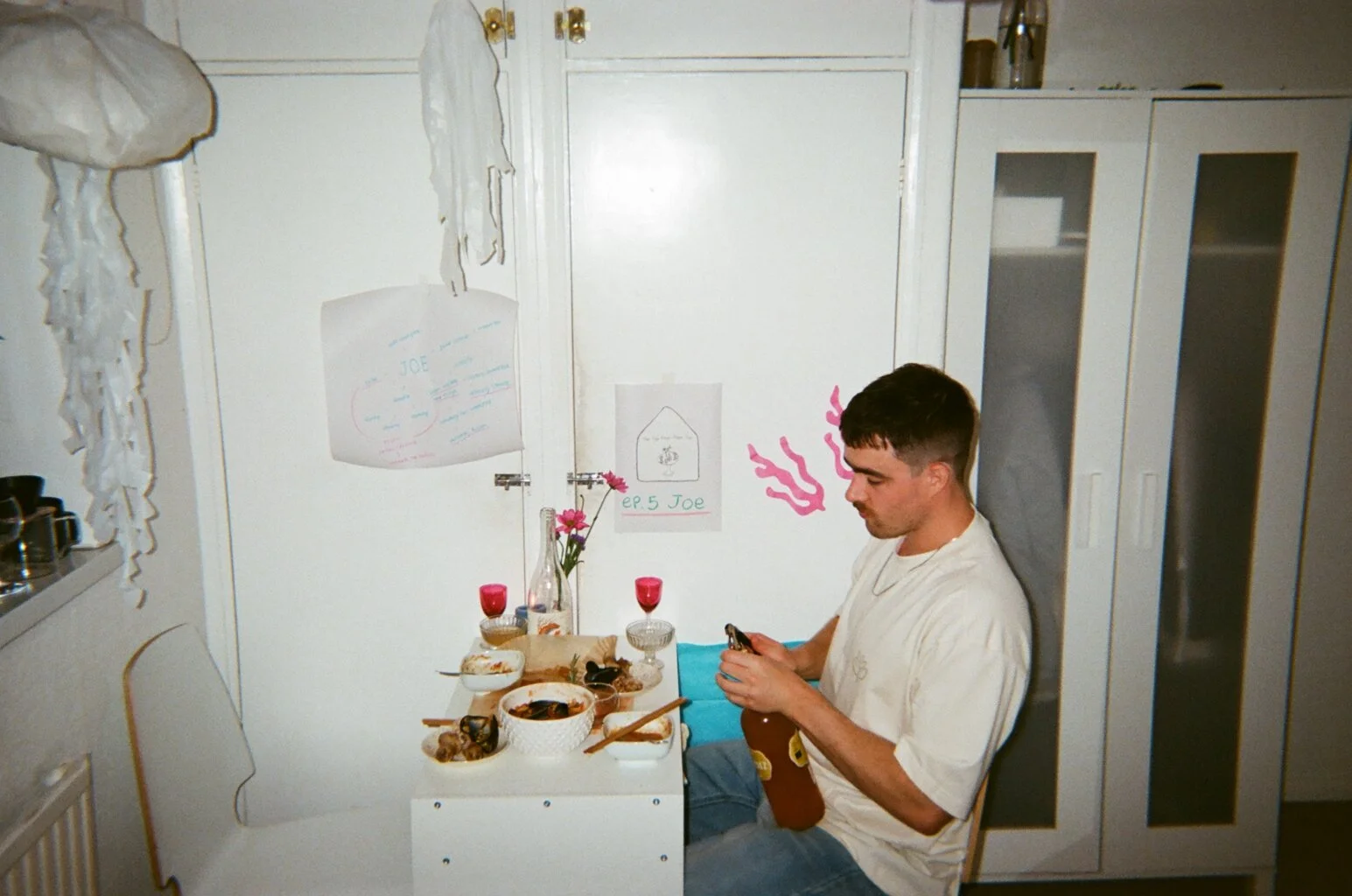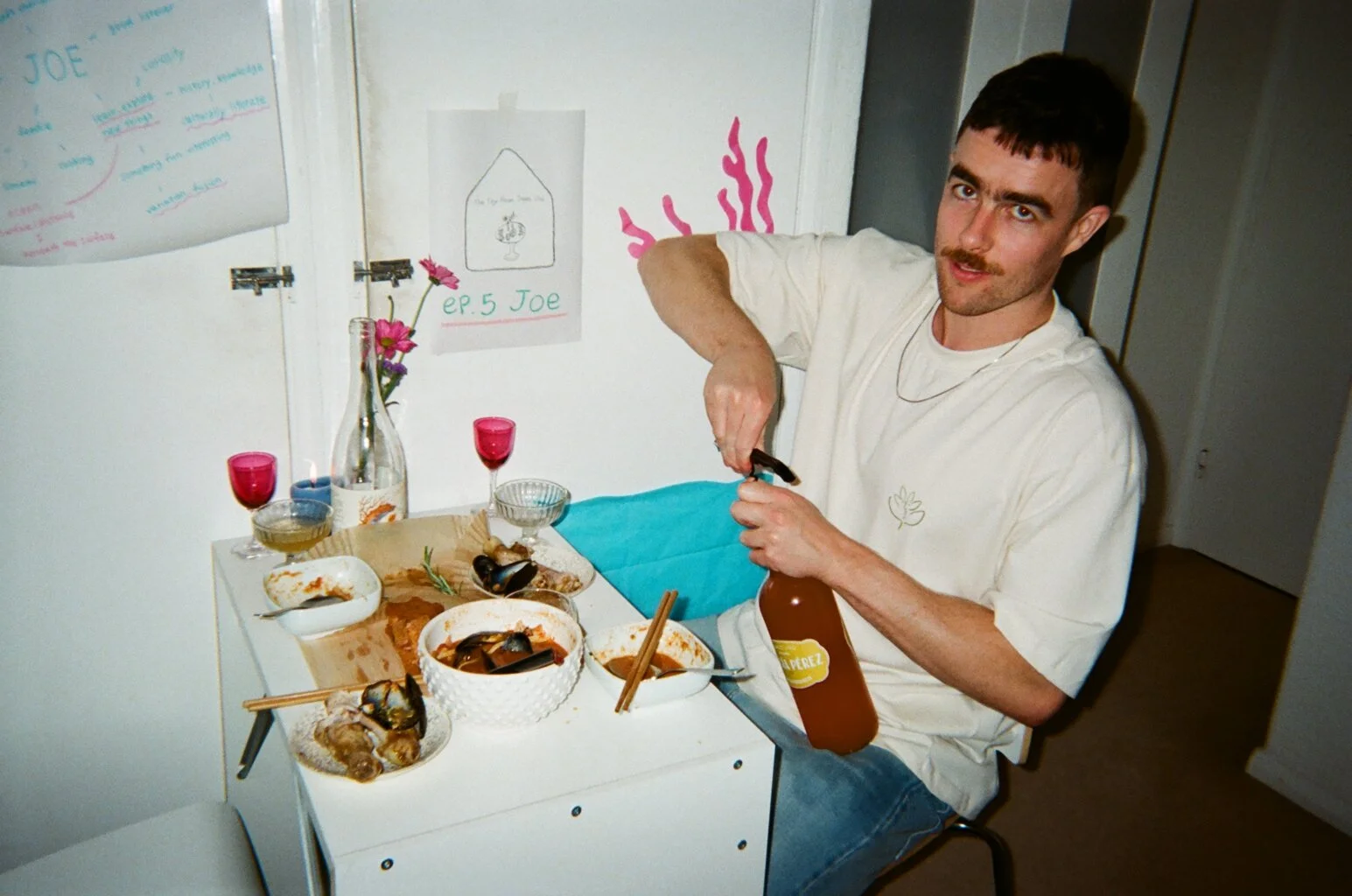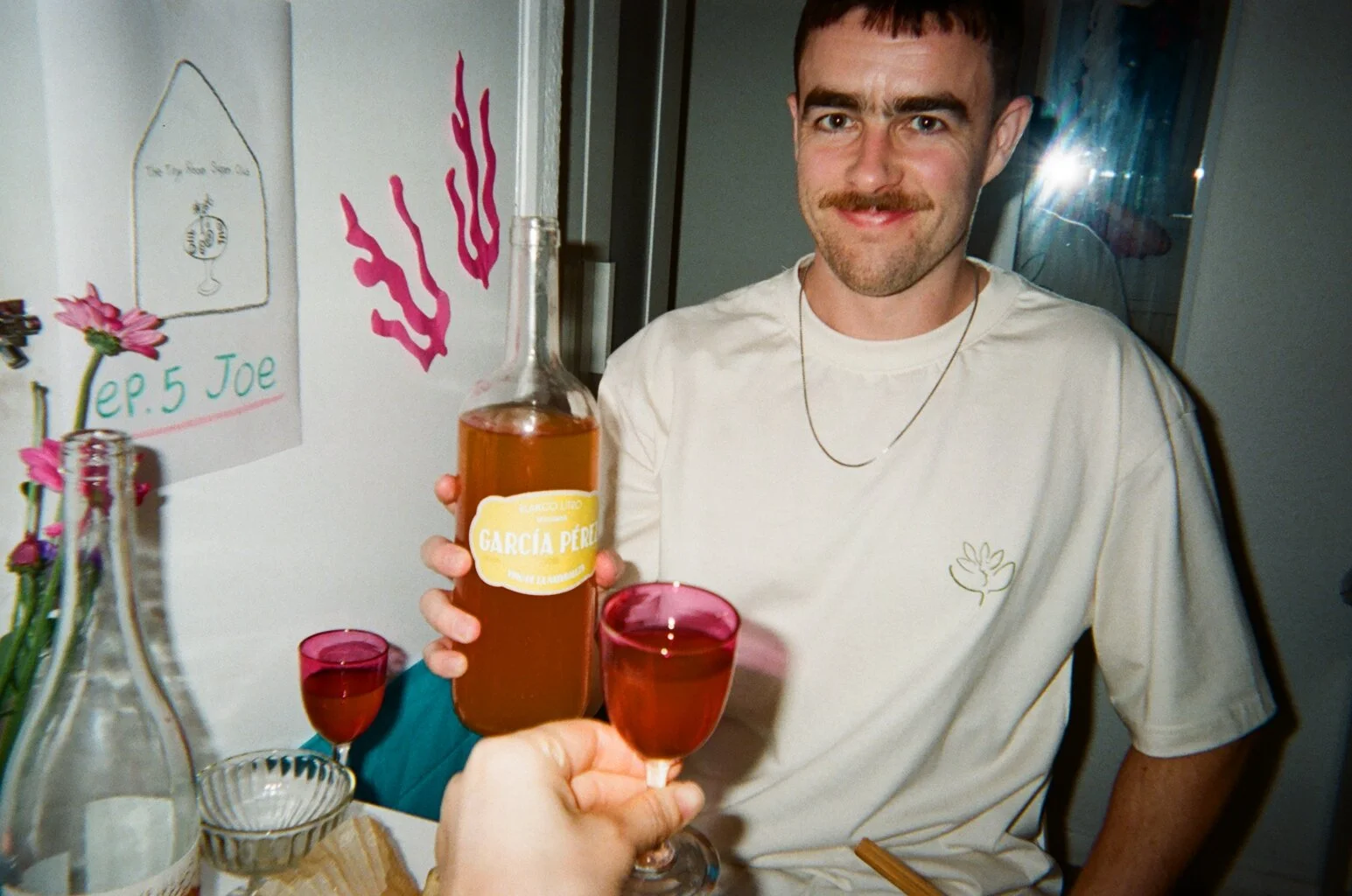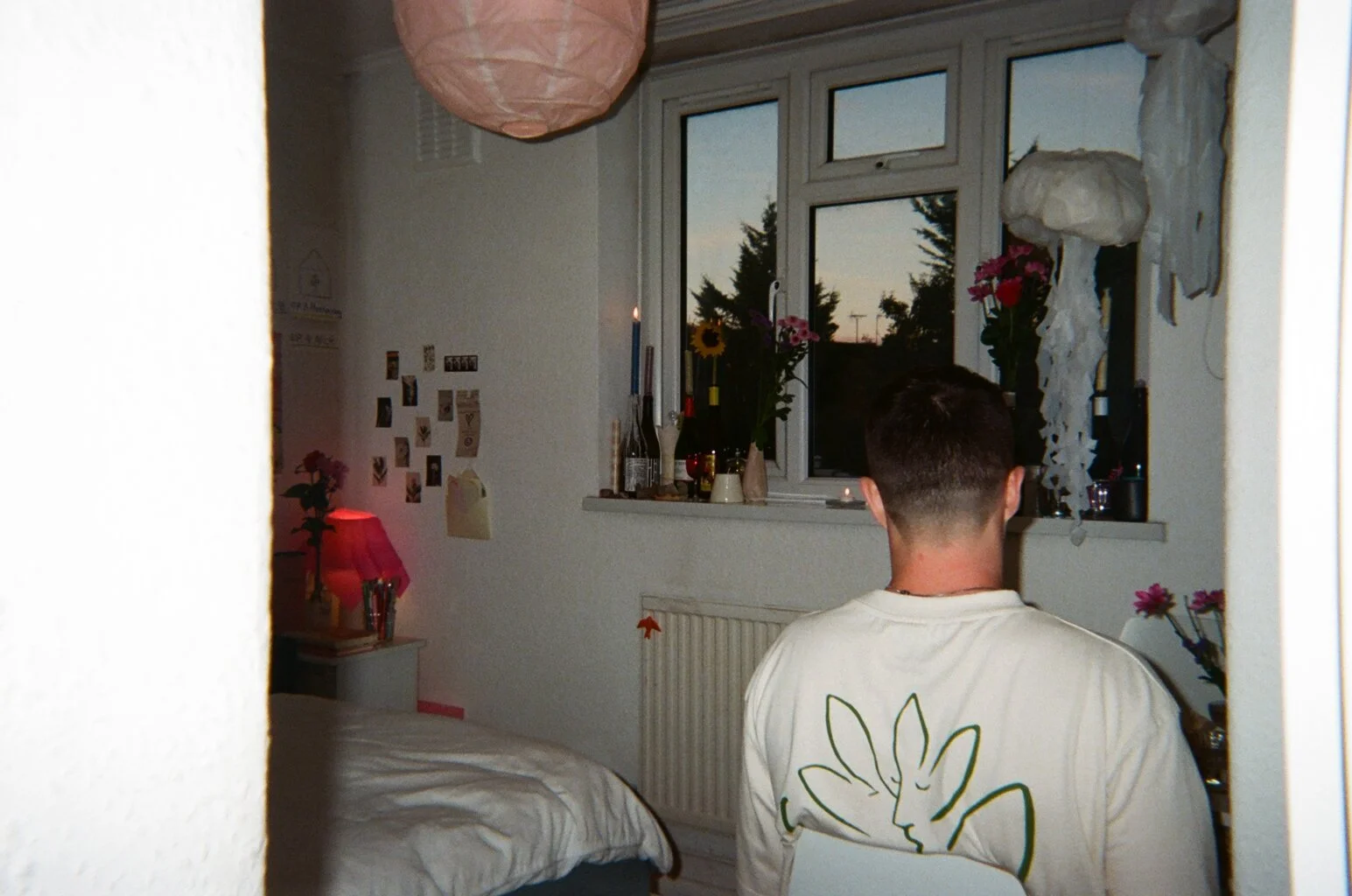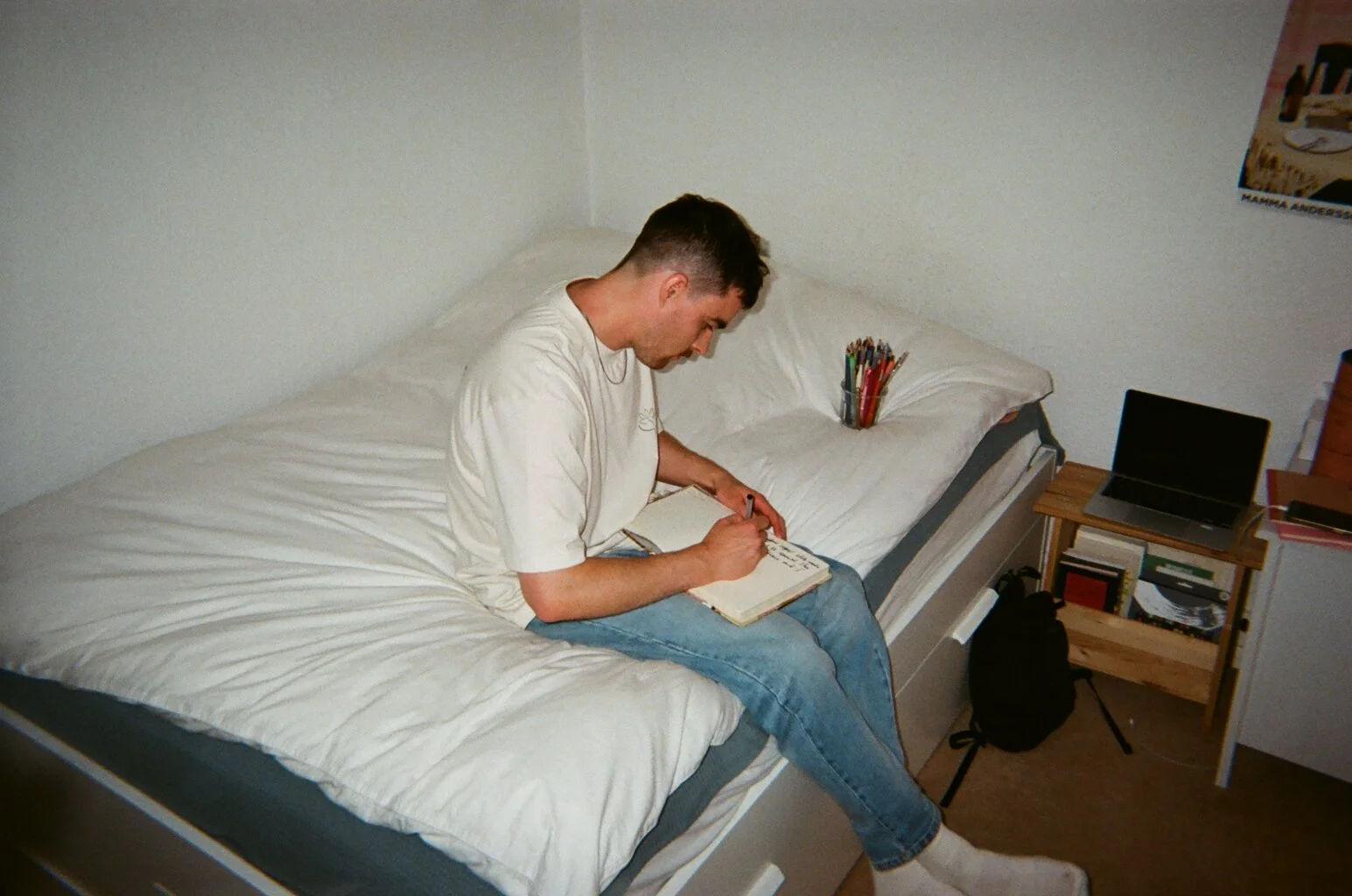
27 September, 2024
Ep.5 Joe

before the dinner・・・
Joe is a friend whose personality is very similar to mine.
One of the ways we are particularly alike is in how we connect with people. For example, in most conversations, I tend to take on the role of a listener rather than leading the discussion with my own stories. However, with Joe, words flow effortlessly from me. I wondered why that was, and I realized it’s because Joe is just as much of a good listener as I am.
So, what makes a good listener? I believe it’s about genuinely paying attention to the other person’s words and empathizing with them. It’s about sincerely stepping into their shoes.
Many assume that the person doing most of the talking holds control over the conversation, but I see it differently. The depth of a conversation depends on the kind of questions the listener asks and how they react.
When I reflect on why I often hold back from speaking, I realize it’s because I only want to share my stories with people who I truly believe will listen. I hesitate out of fear of indifference, afraid of the hurt that comes with feeling ignored, and lacking the courage to face rejection.
But with Joe, I feel safe sharing even the most trivial details of my life. That’s because I trust—without a doubt—that he will listen with genuine interest. In that sense, Joe is not only a great listener but also an incredible supporter.
What I’ve observed about Joe is that he seamlessly integrates his curiosity and desire to explore new things into his life. Whether it's listening to podcasts about topics that spark his interest, attending workshops and lectures, or engaging in various cultural experiences, he never hesitates to try something new. This adventurous nature is also reflected in his approach to food—he has a deep passion for gastronomy and has been exposed to a wide range of cuisines.
Throughout our friendship, we’ve dined at countless restaurants together, and what always delighted Joe the most were dishes that were funky, interesting, and fun. With that in mind, I was inspired by the idea of variations and fusion—taking familiar elements and twisting them in unexpected ways. This led me to curate a menu that blends Eastern and Western influences, offering dishes that feel familiar yet have an exciting kick. Something that makes you question: Is this an Asian dish? Or is it Western?
Since Joe practically lives for umami, I knew I had to create something with a deep, rich broth as its base. That’s when it hit me—a dish that hovers between a spicy seafood noodle soup and pasta, sitting perfectly in the middle of both worlds. For texture contrast, I decided to pair it with something crispy—Menbosha (fried shrimp toast). Lastly, I created a dish featuring chicken marinated in Korea’s signature ganjang (soy sauce) but with an unconventional twist—rosemary.
What makes Joe’s character so interesting is his unexpected contrast. At first glance, he appears calm and composed, but in reality, he is filled with endless curiosity and a deep longing for adventure.
That’s when I realized Joe was just like the ocean—calm and serene from a distance, with an air of tranquility that draws you in. But if you look closer, beneath the surface, you'll find a vibrant world teeming with curiosity and an insatiable desire to explore, much like the colorful marine life where diverse creatures coexist in harmony, each one adding depth and richness to the whole.
So, I wanted to create a space that felt like being underwater. To bring this oceanic atmosphere to life, I crafted jellyfish decorations using discarded plastic bags, repurposing them to add an ethereal, floating effect.
●
●
●
eat & Drink・・・
Spicy Seafood Broth Pasta
Star-shaped Mian bao xia
Fried shrimp toast
Rosemary soy sauce Oven chicken
favonius 2022
Lisboa, Portugal
García Pérez Blanco 2022
Albacete, Spain
talk・・・
True to his love for food, Joe approached each dish with care—tasting thoughtfully, sharing detailed impressions, and asking insightful questions.
For a while, all I could hear from him were endless sounds of delight:
"It's really good. It's really good. Oh my god, this is good. Mmm. It's like the perfect umami, the perfect temperature. Everything is cooked perfectly. The noodles are, like, perfect al dente."
Seeing his excitement was beyond rewarding. Thrilled by his reaction, I shared a little of my philosophy when designing a menu: I put a huge emphasis on how the dishes work together, ensuring each one enhances the next.
Joe understood instantly and summed it up beautifully:
"It’s like the flavors switch perfectly—a really happy cycle. You’ve made me an amazing, elaborate meal. Thank you so much, Sol."
As we talked, I explained how I had chosen a fusion concept for this dinner—blending Eastern and Western elements—specifically with him in mind. That led me to tell him something I'd realized while thinking about him:
Sol: "By the way, when I was thinking about you, I realized that you're one of the most culturally literate people I know—at least among my white friends!"
Joe: "Among your white friends? Oh, you said that so well until that last sentence." (laughs) "Well, you're also extremely culturally literate about white people because you've lived in so many places and traveled across Europe. You might be the most ‘white-literate’ person I know."
Sol: "I'm probably the most Westernized Asian, and you're... how would you say it? Asianized? Hahaha."
Joe then shared an interesting observation about his fiancée (now wife) Jade’s two aunts. One had fully embraced British culture, while the other remained deeply connected to her Malaysian roots. Their cultural identities were reflected in their everyday lives—even in the food they served. One aunt would prepare a classic British roast, while the other would serve traditional Chinese dishes. Joe found it fascinating how people adapt to new cultures in different ways, often influenced by their relationships, environments, and personal choices.
Then he asked for my thoughts.
As a Korean living abroad, I told him that rather than feeling like I’m leaning toward one side or the other, I feel more balanced. The deeper my understanding of both cultures, the better I can navigate the space between them. This balance gives me a sense of stability, and more importantly, it helps me introduce Korean culture to people from different backgrounds.
The way I present Korean culture depends entirely on who I’m sharing it with—how familiar they are, what they’re open to, and how best to bridge the gap. Thanks to my experiences living in different countries and traveling extensively, I’ve developed an intuition for this.
Joe and I talked about authenticity in food, sparked by our visit to Miga, a Korean restaurant he really liked. As a Korean, I wasn’t sure I would call it authentic. Not because of the flavors, but because portion size plays a huge role in Korean dining culture. Generosity is key. But does a smaller portion make it less Korean? Maybe not. It all depends on the audience.
This made me reflect on how I used to think about Korean food abroad. I once believed that if a dish was too authentic, it might not appeal to non-Koreans. But I’ve realized that’s not true—it really depends on the person. Some people are open to unfamiliar flavors, while others stick to what they know. And that’s okay. The key is observing and understanding what someone enjoys.
Joe had a similar experience. He told me about when he first started exploring Asian food beyond the Westernized dishes he grew up with. A friend introduced him to Malaysian food, encouraging him to try new things, even if he didn’t like them at first. That perspective shift—trying something for the sake of trying—changed how he approached food.
Through this conversation, I also realized that introducing a new culture is a very complicated job. There’s no one right way to do it. Do you present it in its most traditional form, or do you adapt it to be more accessible? Do you focus on education, or do you let people discover it at their own pace? These questions don’t have simple answers, and that’s what makes it so fascinating.
I used to judge Korean restaurants based on portion size, assuming smaller servings made them less authentic. But now, I see it differently. Authenticity isn’t always about tradition—it’s also about intention. Some places cater to Koreans craving home-style comfort, while others focus on introducing Korean flavors to a different audience. Neither is wrong. It’s just a different approach.
Food, like culture, is nuanced. Maybe there’s no single definition of authenticity—just different ways of connecting.
As Joe picked up my point-and-shoot film camera and snapped a picture, he laughed and turned it over in his hands. He mentioned that the last time he had used one was during a family trip to Australia. At the zoo, he had taken pictures of birds and other animals and kept a small notebook with notes about them. When he returned to school, he had to present his trip to the class, which he found terrifying.
I could relate to that feeling, as I was always nervous about presentations too. I would come up with any excuse to avoid them. Joe agreed, saying that most kids feel the same way, whether it’s about presentations or physical education. We both agreed that part of it was about competition and the pressure to perform.
Although we both had been avoiding presentations for so long, we eventually overcame our fear through the unavoidable experiences life threw at us. For me, it was the group presentations in university, and for Joe, it was leading countless meetings at work with other employees. It was through these experiences that we gradually became comfortable with presenting. It made me realize that sometimes, facing situations we want to avoid but can't escape is actually an important part of life. Joe agreed, adding, “You know, it’s all about building up. You build up in your life. If you never do it, you’ll never do it.”
Joe brought up an interesting concept: Puer Aeternus. He explained that he had been learning about it recently and found it particularly thought-provoking. The term, which translates from Latin as “eternal boy,” refers to a psychological archetype describing individuals who remain childlike throughout their lives—often behaving like so-called “man-children.”
This idea, explored by psychologists such as Carl Jung and later expanded upon by Marie-Louise von Franz, highlights how some individuals—particularly men—struggle with maturity. They may have trouble holding steady jobs, lack focus, and seem uninterested in personal growth. Instead of embracing responsibility, they cling to an idealized, carefree existence, avoiding the burdens of adulthood. Joe mentioned that this concept had come up in a podcast he was listening to, and it made him reflect on his own life and the paths he and his friends had taken. He had chosen a different trajectory—moving abroad, working in tech—while many of his childhood friends in New Zealand remained in the same routines, still immersed in the same hobbies and social circles. This made him wonder: Was Puer Aeternus simply about immaturity, or did it also describe the feeling of being stuck in a familiar, unchallenged world?
His reflections resonated with me. Growing up in the countryside in Korea, I observed how access to education significantly influenced individuals' futures. South Korea's education system is highly competitive, with a strong emphasis on academic achievement. Students spend years preparing for the university entrance exam, which can largely determine their career and social mobility. The top universities—mostly located in the capital city, Seoul—attract students from diverse backgrounds and offer access to a much broader network of people and opportunities. However, not everyone makes it through this highly competitive process. Consequently, students who may not secure placements in these institutions due to the intense competition and systemic inequalities might remain within familiar social circles, limiting their exposure to new ideas and experiences. However, it's important to acknowledge that this is not a universal outcome; many individuals find alternative paths to broaden their horizons beyond traditional academic routes.
Some of my teenage friends who didn’t get into top universities ended up staying in our hometown, surrounded by the same people, having the same conversations, and rarely venturing outside their comfort zones. Without the experience of moving to a different city or meeting people from different walks of life, their world remained small—confined to what they already knew. For me, stepping out of that familiar space was a turning point. I had the opportunity to live in Austria during middle school, immersing myself in a completely different culture at a young age. Later, attending a university in Seoul introduced me to individuals from various backgrounds, further broadening my horizons. These experiences facilitated personal growth that might not have been possible had I remained in my hometown.
I began to see that Puer Aeternus isn’t just about refusing to grow up—it’s also about being confined to a limited world. If someone never has the chance to step beyond their familiar environment, how can they even begin to change? It’s not necessarily a personal failure. When a society doesn’t provide equal opportunities for education and exposure to different perspectives, it reinforces the Puer Aeternus phenomenon. This is especially visible in Korea, where the competition for education and success is so intense that those who fall behind often remain stuck in the same cycles—limiting their worldview without even realizing it.
Joe also pointed out the role of the internet in breaking these boundaries. With the freedom to access information online, anyone can learn and explore new ideas. While financial limitations still exist, the digital world offers a unique opportunity for growth. Ideally, people should have the chance to travel and experience the world, but in the meantime, the internet and technology provide a powerful tool for expanding one’s horizons.
Before diving deeper into our conversation, we decided to finish the wine I had brought and open the bottle Joe had picked out. The moment we took our first sip, our eyes widened in surprise. The wine, bursting with an incredible fruitiness we’d never experienced before, completely filled our mouths. Joe and I love reminiscing about past wine tastings and sharing the flavors we pick up, but with this one, we just couldn’t seem to agree on anything! Completely captivated by this new discovery, we both expressed our gratitude to Sia, the wine shop owner who had recommended it, and kept the conversation flowing.
Joe and I are one year apart. At the time of the supper club, I was just about to turn 30, and Joe was 31. I wanted to reflect on our twenties, talk about what we’re looking forward to in our thirties, and explore what we might have done more of in our twenties if we could go back. Honestly, that question was really for myself, since I was about to turn 30.
Joe then shared his thoughts on his twenties. He admitted that he hadn’t always given this period much thought, but after our discussion about Puer Aeternus and the idea that growth only happens when you change—something that requires experiencing situations that push you to evolve—everything started coming together. He recalled a vivid memory from high school, when, at 17, a friend showed him a YouTube video of a physicist discussing astrophysics. That moment sparked a shift in his mindset. Until then, Joe had never seen YouTube as a place for educational content that he could genuinely enjoy. But that moment marked the beginning of a more curious approach to learning. While he didn’t suddenly excel in physics, he began reading outside of his academic life, diving into literature and works by authors like Dostoevsky and Tolstoy, whose philosophies deeply influenced him.
During his university years, he found himself reading more than ever, absorbing ideas that helped shape his worldview. But by his mid-20s, when he started working, his focus shifted. Work took up more of his time, but he still spent energy learning about himself, navigating adult relationships, and figuring out what truly mattered. By the time he reached his late 20s, he began to think more seriously about his next steps, which eventually led him to move to London. Reflecting on his journey, Joe said that while he hadn’t experienced a single defining moment, his transition through his late 20s had been significant. His views on relationships, life’s purpose, and personal motivations had all shifted profoundly.
Looking ahead to his 30s and beyond, Joe felt confident that his foundation had been solidified. Whatever came next, he would approach it with a clearer sense of direction, guided by the principles he had honed over the years. While he joked that he might not fully understand everything now, he believed that, when he reached his 40s, he would look back and see how far he had come in understanding himself.
I couldn’t help but ask Joe how he thought he might feel when he’s older. "You think you’re going to base your 30s and 40s on the principles you have now," I said, "but I wonder how you’ll look back on this period when you’re 39 or 40. Maybe you’ll say, 'Sol, life is more interesting than that.'."
Joe paused for a moment before responding. "There are still formative things I haven’t experienced yet. I haven’t had children, I haven’t bought a house, and I’m not married yet, though that’s coming soon," he said. "I do think that, between now and when I turn 40, my mindset will change. Right now, compared to my mid-20s, I feel more settled—not in the sense that I don’t want to change, but in that I know who I am and what I want."
I could relate to what Joe was saying. "More confidence," I said. "I know exactly what you mean. I feel the same way. I really love my current age, and I don’t want to go back to my 20s, but I really enjoy where I am now. I feel like I’m finally turning my words into actions, and I can show people the results of that."
As the conversation shifted, Joe asked me about my own sense of achievement. He wanted to know how I gauged success and whether external factors, like job opportunities, played a role.
I explained that one of the things I valued most was my habit of journaling. When I looked back at my journals from five years ago, I realized my goals hadn’t really changed. I still wanted to accomplish the same things, but back then, I didn’t feel like I was in the right environment or surrounded by the right people who could support me. I also wasn’t fully confident in my goals. Over time, though, I had made real progress. I had started trusting myself more and taking concrete steps toward those goals. I mentioned that I was a planner—someone who liked making long-term plans. Before moving to London, I had written down exactly what I wanted to do differently from my time in Austria and Finland.
Joe shared that he hadn’t applied this level of introspection to his personal life until recently. His previous approach was more work-focused, influenced by a manager who taught him to consider what he was gaining and giving in a job. When he moved to London and joined a new company, he started setting clear goals. Lately, he had applied this mindset to his life outside of work, reflecting on questions like, "Why do I want to be in New Zealand?" and "What will I gain from this experience?" It was a new way of thinking he hadn’t previously considered for his personal life.
I nodded in agreement. "Yeah, you’re starting to think about your life values and apply them to your daily life."
Joe smiled. "Exactly. Everything now goes through those filters. I want to work for a tech company in Auckland so I can contribute to New Zealand, help my friends and family live better lives, and maybe even make a difference for future generations."
I remembered a story Joe had shared with me about his time at Vend. "I remember you told me about going to a local shop in New Zealand and seeing a system you created in use," I said.
Joe smiled. "Exactly! Recently, I was networking and heard someone mention the programming language I first learned at Vend. It turns out many tech startups in New Zealand now use it, and hearing about its continued influence was incredibly rewarding."
"It’s really cool," I said, impressed by how far his work had reached. "I think not many people realize the kind of impact their work can have. Often, we think of our jobs as benefiting the company owners, not ourselves. But I really like the idea that every action we take can contribute to something meaningful, even in small ways."
Joe agreed, reflecting on the broader implications. "It’s a nice thought. As long as we continue to operate in a capitalist system, which, for now, seems to be the only viable model, it’s important to think about how we inspire others and create an impact on our environment. That’s the cool part about it."
As the conversation continued, I shared my vision for the future: I wanted to build a community where people could work together toward making the world—or at least a small part of it—a better place. I imagined a space where everyone could learn from one another and find joy in the process.
Joe found the idea intriguing and pointed out how most companies start with a clear passion but often lose that spark as they scale. Structures emerge, new personalities come in, and the culture inevitably shifts. I agreed and admitted that I sometimes wondered if staying small was the only way to preserve a strong sense of purpose—though I feared that was a naive way of thinking.
Joe reassured me it wasn’t naive. He shared his own experience at a company that grew from 250 to 300 employees, and how he’d felt the shift in culture. While change was inevitable, he believed that strong leadership could still keep a company inspiring and fun to work for, despite its size.
This led us to reflect on our shared leadership style—one that operates quietly from behind the scenes, focused more on empowering others than seeking the spotlight. I scribbled down "supporter" and "soft charisma" on the keyword map I’d been making for Joe, realizing how similarly we approached leadership.
The conversation shifted to the gig we had attended in the UK, where we saw the Ambiguous Dance Company perform. The performance was incredible, but I couldn’t help but think their social media marketing didn’t do justice to the quality of their work. With my background in marketing and branding, I felt I could help improve their online presence and increase their recognition. I considered emailing them with some ideas, but hesitated. I wasn’t sure if they already had a marketing person, and I didn’t want to offer unsolicited advice.
Joe immediately told me I should have emailed them while the emotion was still fresh. He explained that stoicism often encourages us not to act on emotions and to let things settle before making decisions. But he felt the opposite—sometimes, it’s better to act on emotion. This was a perspective I hadn’t considered. I tend to overthink and hold back until everything feels perfectly in place, but Joe’s point made me realize that acting on genuine emotion can be just as important.
As we continued talking, Joe shared that he had recently messaged someone involved with Auckland’s transport system. Frustrated by the city’s transport issues, he felt compelled to reach out, even though he didn’t know how the person would respond. His story made me reflect on how often I hold back from taking similar actions due to self-doubt. Joe’s experience pushed me to consider how fear and hesitation may stop me from acting when I’m truly passionate about something.
Eventually, I admitted to Joe that I still struggled with that fear of reaching out. I worried about being seen as inauthentic or intrusive, which made it hard to take the first step. In response, Joe told me something that really resonated. He said, “The best advice for women is to act with white male privilege.”
His words lingered with me long after the conversation ended. It was a reminder of how often we hold ourselves back with self-imposed limitations, and how stepping past those barriers—no matter how small the action—can open up new possibilities.

after the dinner・・・
Sol, your supper club made me feel so special. The food was delicious and I felt like every last bit was curated for my enjoyment.
Thank you so much.
You are an amazing friend.
xo Joe
27.09.2024
Dear Joe,
It’s beautiful to see that both of us feel so confident in where we stand right now, and that life isn't just about our individual pursuits, but about expanding our scope to contribute to the world. I believe this shows how deeply we’ve structured our lives, not only because we’re confident in our ability to take care of ourselves but also because we have so much more to give to others. Reflecting on our conversation, I noticed how our life trajectories are so similar. Perhaps that’s one of the reasons we connect so deeply. I, influenced by my parents who encouraged an open mind and a desire to experience a bigger world, and you, influenced by your environment, both chose to live outside our home countries. We’ve both expanded our views of the world and continuously explored our roles within it. We’re now both navigating our lives not just on a personal level but looking for ways to contribute to society. Through our experiences in our 20s, we’ve learned how to shape our environments and choose where we want to be. In this sense, I feel that our prime time is just beginning.
I remember the time when we talked about how the five people closest to us had the greatest influence on our lives. You were always one of those five people in my London life, and I can’t express how much you impacted me. Having a friend who’s resilient, healthy both physically and mentally, and sincere, was a true blessing. Thank you for being such a great influence during my time in London.
Though you're physically far away now in New Zealand, knowing that I have such a strong ally who will always welcome me from across the world makes me feel incredibly lucky. I'm genuinely rooting for you as you move through your 30s, and I can’t wait to keep having these meaningful conversations with you.
The memories we created in London, and our reflections on our 20s, always remind me of a line from the movie Yes Man: "The word 'yes' has changed my life." For me, my 20s were exactly that—saying "yes" to new experiences, being brave, and exploring as much as I could. And at the end of my 20s, I met you, my "yes man" friend, who encouraged me to embrace even more new challenges. The incredible things we created together by simply saying "yes"—I’m so grateful for that. You’ve helped me build the confidence I now carry into my 30s.
There was a moment during our conversation where I said, "I felt like our relationship is just like unique, pure, and innocent." You replied, "I’ve also never had it before in my life. I just truly feel that we respect each other and we kind of know each other very well, like really, really well." We couldn't quite put into words why our connection felt so special, but reading through the conversation we've had now, it feels like the words perfectly capture the essence of why it felt that way. There’s something about our mutual respect and understanding that’s truly rare, and I’ll always cherish it.
Thank you, Joe, for everything. I truly wish you all the best as you enter this new decade of your life, and I look forward to seeing how we’ll continue to grow.
With gratitude and love,
Sol


